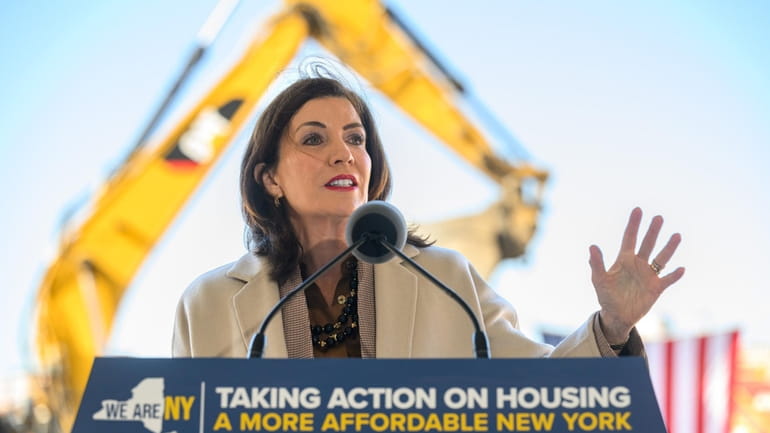State leaders should make a big push on housing

Gov. Kathy Hochul, seen announcing a housing program for Brooklyn in February, has been unable to make much headway on housing in Long Island communities. Credit: Office of Governor Kathy Hochul/Susan Watts
Young Long Islanders are leaving the region, citing as a primary reason the cost of buying or renting a home, census data and Long Island Association research show. Elected officials in state budget negotiations are again seeking ways to encourage housing production, hoping to ease prices and make it easier for Long Islanders and others to stay in New York.
But no one has a cohesive plan that can bring advocates and major players in this process on board. Last year, Gov. Kathy Hochul's Housing Compact went too far in attempting to mandate zoning strategies and the backlash was severe. Nothing got done. Then Hochul took a different tack, dangling incentives. Unfortunately, Long Island communities have been slow to respond; only 16 have launched “pro-housing” applications that would give them access to additional pots of state money.
Now, Hochul and state lawmakers are exploring other steps. Focusing on New York City, they're trying to produce a new version of the 421a tax break for developers, to facilitate the conversion of commercial properties to residential ones and to adjust the ratio of the size of a building to its lot. The meltdown of the 421a revision last year scorched all other parts of the deal as well.
While a new 421a could expand the city's housing stock, it won't help the suburbs. Hochul's incentive efforts could — if more Long Island communities take part. But she and state lawmakers are considering other promising approaches, like using state land for housing. The State Senate suggested establishing a public benefit corporation to help finance such construction. The strategy, modeled on the old Mitchell-Lama program named for the legislators who arranged the complex financing, has pros and cons but the lack of detail makes it difficult to assess.
Another interesting notion: making it easier to build housing on properties owned by religious institutions. Known as the Faith-Based Affordable Housing Act, the effort importantly has bipartisan support on Long Island, including from Assembly members Jodi Giglio, a Republican, and Fred Thiele, a Democrat. State officials say large swaths of land could benefit.
But one idea hovering over those important conversations remains problematic. “Good cause eviction” — pitched as tenant protections — has taken on a life of its own, with some progressive lawmakers saying they won't support a housing plan without it. Hochul has rightly opposed good cause eviction. State leaders hope to find a middle ground. That's worth considering, but only if it won't make housing construction more complicated, arduous or expensive. The “good cause” label is misleading and shouldn't become the bad reason a solid housing plan eludes Albany yet again.
So far, Hochul and lawmakers haven't been able to get out of their political silos to move the needle on housing. They must. Long Island's economic future — and its current and future residents — depend on it.
MEMBERS OF THE EDITORIAL BOARD are experienced journalists who offer reasoned opinions, based on facts, to encourage informed debate about the issues facing our community.
